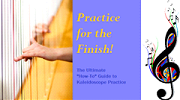Two Ways to Get a Music Conservatory Education

Concert at the Paris Conservatory, 1843
The music conservatory: a hothouse for nurturing musical talent and an opportunity available to only the select few. For hundreds of years these elite music schools have trained world-class musicians and the tradition continues. The focused atmosphere and the access to instruction from the finest teachers and performers make a conservatory education the goal of many ambitious music students.
So how do you get a conservatory education? There are two ways. First, let’s consider the content of a “conservatory education."
(One quick note: in using the term “conservatory” I am by no means excluding the many excellent university and college music departments and their programs, many of which equal any conservatory in superb faculty and famous alumni. I myself am proud to be part of such a university music program at the University of Delaware.)
What exactly constitutes a conservatory education? There are many components of course, but most of those components fall into the same three categories that every musician follows no matter where or how they are learning: intense, specialized study in their chosen area; developing relevant musicianship skills and knowledge; extensive performance preparation. It’s a rigorous course of study designed to train musicians to be consummate performers with a deep knowledge of the inner workings of their craft.
One way to that get that kind of intensive training is to create a similar curriculum for yourself. The create-it-yourself method can not only provide you a complete and individualized course of study, but it can be deeply satisfying too. After all, you get to be the student, the dean and the curriculum chairman all at the same time. Here’s a quick outline of what you will need to study and where to look for your “faculty.”
Area #1: Specialized Study
The number one component of this area will be your lessons. Private lessons on a regular schedule with a teacher who will help you develop and meet goals is the biggest factor in any musician’s development, and creating your own curriculum doesn’t exempt you from this. A teacher’s expert guidance, combined with their knowledge of the larger musical world, will show you opportunities and possibilities that you couldn’t have possibly seen on your own.
Your specialized study curriculum should also i nclude master classes, lessons or courses with other respected performers and teachers in your field. When you broaden your experience in this way, you enrich your own music-making. And try to attend master classes by famous performers on other instruments too. For instance, even if you aren’t a cellist, Yo Yo Ma can teach you a lot about making music. Make these “mandatory” in your conservatory curriculum.
Area #2: Musicianship
Musicianship encompasses so many areas that without a few guidelines you could easily feel overwhelmed. Standard musicianship studies include course in music history, music theory, ear training or aural skills, sightreading, improvisation and more. The good news is that in your role as “curriculum chairman,” you can set the pace and emphasis of your studies. Here are some suggestions for easy study opportunities:
Music History
Read biographies of great musicians and composers.
Learn a few facts about the composer or time period of each piece you play. Connect the music you learn with art, literature or world events from the same era.
Music Theory
Start by paying attention to key signatures, scales and chords.
Practice scales, arpeggios and chord progressions regularly.
Online courses are an easy way to pick up the basics or pursue more specialized learning.
Aural Skills
Sightread something every day.
Invent a short melody and write it down. (It’s amazing how much better your note and rhythm skills get when you have to commit notes to paper.)
Spend two minutes each day doing note reading and rhythm drills.
Here again, online courses will help you go deeper when you’re ready.
Area #3: Performance Preparation
Even if you think you never want to play in front of an audience, you need to learn the skills that are part of performance preparation. These are the tools that enable you to play a piece fluently and confidently from beginning to end and truly make music, rather than just play the notes. They are learned in your lessons with your teacher, and developed through music-making with others.
One of the best ways to develop performance skills is to play with an ensemble. Whether it’s a group of friends or a community orchestra, learning to practice and play music with other musicians will allow you to use all the information and knowledge you have gleaned from your “curriculum” and place it in service of the music, which is the ultimate goal of any musical endeavor.
There is a basic “create-it-yourself” conservatory curriculum.
And the second way to get a conservatory education? That’s simple. Practice very hard, audition at the conservatory of your choice and off you go, assuming that you’re accepted, of course. I said it was simple; I didn’t say it was easy. Are You Ready to Practice for the Finish?

50% Complete
Two Step
Lorem ipsum dolor sit amet, consectetur adipiscing elit, sed do eiusmod tempor incididunt ut labore et dolore magna aliqua.